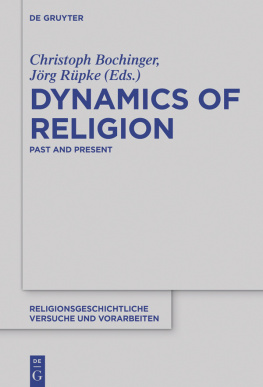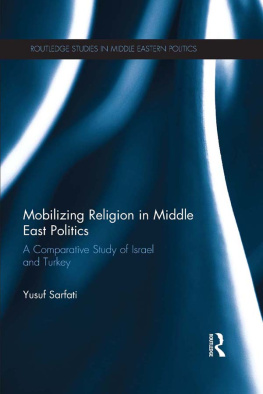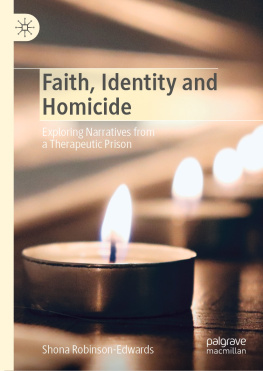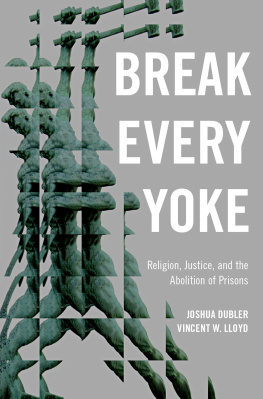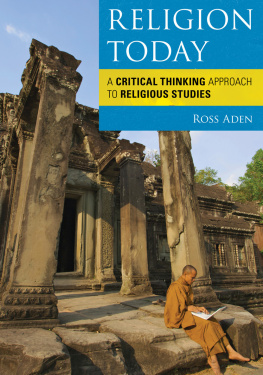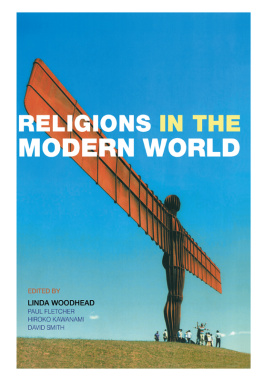IMPRISONED RELIGION
The subject of religious life in prison in all of its varied manifestations is an acutely under-researched area. This volume makes a significant contribution to our understanding through both theoretically and empirically informed chapters.
Stephen J. Hunt, University of the West of England, UK
This book combines theoretical sophistication with subtle analysis of vibrant interviews conducted with inmates and former inmates of prisons in Eastern Germany. The fascinating light that it throws on the place of religion in prisons challenges many assumptions about religion, the state, modernity and prisons. The contribution that it makes towards our understanding of recent changes in inmates experiences of religion and incarceration will be invaluable to a wide range of social scientists and policy makers.
James A. Beckford, University of Warwick, UK
This book explores the profound transformations that prisons and offender rehabilitation programmes in Eastern Germany have undergone with respect to religion. Drawing on participant observation and interviews of inmates, ex-prisoners, chaplains and prison visitors, this book connects the institutional to individual: focusing on the religious changes individuals experience when they are imprisoned and released. Including comparative studies from Italy and Switzerland, Becci reveals that despite diverse local, historical, denominational, political and social contexts the transformation patterns of individuals relationship to religion, and their use of religious resources, are strongly shaped by the total character of prisons. Becci also explores the difficulties faced by released people in keeping their religious life alive under the harsh conditions of social stigma in a highly secular outside society.
Imprisoned Religion
Transformations of Religion during and after Imprisonment in Eastern Germany
IRENE BECCI
University of Lausanne, Switzerland
First published 2012 by Ashgate Publishing
Published 2016 by Routledge
2 Park Square, Milton Park, Abingdon, Oxon OX14 4RN
711 Third Avenue, New York, NY 10017, USA
Routledge is an imprint of the Taylor & Francis Group, an informa business
Copyright Irene Becci 2012
Irene Becci has asserted her right under the Copyright, Designs and Patents Act, 1988, to be identified as the author of this work.
All rights reserved. No part of this book may be reprinted or reproduced or utilised in any form or by any electronic, mechanical, or other means, now known or hereafter invented, including photocopying and recording, or in any information storage or retrieval system, without permission in writing from the publishers.
Notice:
Product or corporate names may be trademarks or registered trademarks, and are used only for identification and explanation without intent to infringe.
British Library Cataloguing in Publication Data
Becci, Irene.
Imprisoned Religion: Transformations of Religion during and after Imprisonment in
Eastern Germany.
1. Prisoners Religious life Germany (East) 2. Ex-convicts Religious life
Germany (East) 3. Imprisonment Religious aspects. I. Title
204.208692709431dc23
Library of Congress Cataloging-in-Publication Data
Becci, Irene.
Imprisoned Religion: Transformations of Religion during and after Imprisonment in
Eastern Germany / Irene Becci.
p. cm.
Includes bibliographical references (p. ) and index.
1. Prisoners Religious life Germany. 2. Imprisonment Religious aspects
Christianity. 3. Imprisonment Religious aspects. 4. Psychology, Religious.
5. Imprisonment Germany. I. Title.
BV4595.B43 2012
274.30086927dc23 2012013759
ISBN 9781409411611 (hbk)
ISBN 9781315588018 (ebk)
Contents
List of Figures and Table
Figures
Table
Acknowledgements
While carrying out this study I benefited from the valuable support of a number of colleagues and institutions. I first wish to thank the European University Institute in Florence, where I completed my dissertation under the joint supervision of Professor Peter Wagner and Professor James Beckford. I am also deeply indebted and grateful to Professor Beckford for his inspiration beyond my doctoral work as I carried out post-doctoral research and then engaged in further comparative studies. My postdoctoral fellowship at the Max Planck Institute for Social Anthropology in Halle/Saale in Germany provided both perfect conditions and creative encouragement for my fieldwork, in addition to the necessary financial support to publish the results of my sustained studies. I am particularly grateful to Professor Chris Hann, whose advice and intellectual stimulation have been invaluable. My more recent work in Switzerland was made possible thanks to the constructive support of Claude Bovay and the financial help of the University of Applied Sciences of Western Switzerland and the Swiss National Science Foundation.
A number of other people assisted and supported my enterprise in various ways, starting with Jean Terriers initial encouragement and ending with Elisabeth Arwecks patient editorial work on my manuscript. I am deeply grateful to every one of them, including all the participants in my research who gave their time to speak to me and who were willing to discuss in such an open, honest and modest way issues that were emotionally charged, given the challenging environment in which many of them had found themselves. However, I am, of course, solely responsible for the present work and for any misrepresentations that may have inadvertently found their way into it.
Introduction:
Conceptual and Methodological Clarifications
When I started to design the project for the present study, the twin towers in downtown Manhattan were still part of its skyline and the clash of civilizations was an idea with which only some academic circles were concerned. Religion was not often used in connection with the word prison. In Europe, only a few sociological studies had been carried out on religion and prison in the then current conditions. The public debate was preoccupied with issues of migration and increasing religious diversity. The latter, however, was not the object of systematic study as it presented itself in the context of the prison. Indeed, the only study I knew of was that conducted by James Beckford and Sophie Gilliat on religion in the prisons of the United Kingdom. This work, and the various research projects it inspired around Europe, assumed that religion was of great importance to prisoners, although the latters perspective was not analysed. The study by Beckford and Gilliat focused on questions of equality and inequality in a situation of great religious diversity. The results demonstrated among other things that the establishment of the Anglican Church necessarily caused an imbalance. One example is the brokerage My point of departure was thus the aim to contribute to the understanding of religion and prison by including in my analysis knowledge from the standpoint of inmates and ex-inmates in the form of empirically collected data.
While the present work tackles questions that are central to the sociology of religion, it attempts to answer them by borrowing arguments and methodological insights that are peripheral to the field, such as those of critical sociology, anthropology, ethnomethodology or symbolic interactionism. sociological studies of prison have oscillated between two approaches: some authors have studied prison from a so-called diffusionist perspective, which implies that social life inside and outside prison is considered to be linked and that understanding the prison system helps to comprehend society itself; other authors have rejected any generalization and stress the particularity of total institutions. I shall argue that, in many regards, prison is a distinct environment. However, many elements that make it different actually depend on the way crime is managed outside prison. A similar reasoning may be exercised as far as religion is concerned. The fact that prisons are now overcrowded and that certain social and religious groups, such as foreigners and the poor, are over-represented in the prison population does point to ongoing processes that concern both prison and society in general. In prison, individuals are confronted with existential questions in a particularly intensive way. The conditions of detention and everyday struggles for freedom in relation to space, time and body create a situation in which religion gains particular meaning. Prisons are also spaces of socialization, which becomes very clear when looking at how religion is transformed at release, when conditions change drastically.


